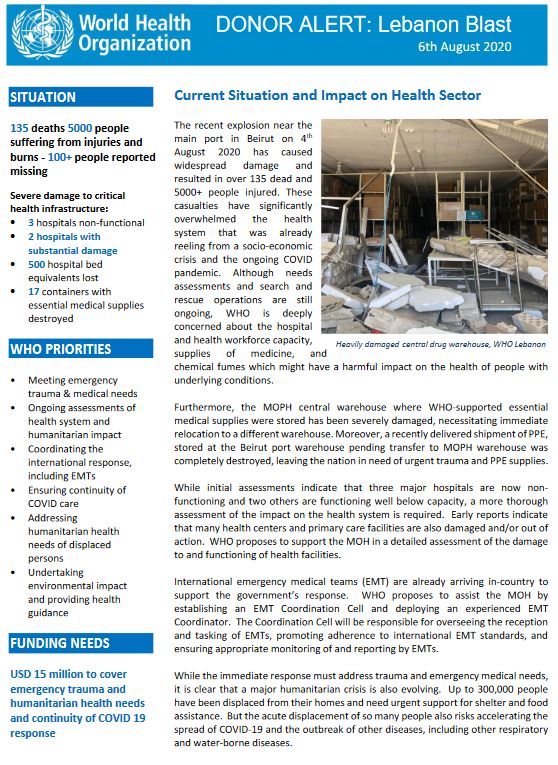12 August 2020 – Thank you for joining us for the regional press briefing on the health situation and response to the Beirut blast. Once again, we express our sympathies to all those who have lost loved ones, and to all those who have been injured.
People in the city and across the entire country are still reeling from the impact of the blast that literally ripped apart communities, homes, hospitals and other infrastructure. It also reopened the deep wounds of a people still affected by years of civil war, economic crisis, a long-lasting refugee burden, and a deadly COVID-19 pandemic.
As communities start rebuilding their home and lives, recovering from the psychological impact of the blast is expected to take much longer.
One week after the blast, WHO remains concerned about the health and well-being of people who have been injured, lost loved ones or who have been displaced.
We are also worried about the overall state of the health care system and health workforce in the country – that was already under severe strain and which now has lost the full capacity of 3 hospitals, partial capacity of 3 hospitals, many health clinics, and tonnes of medical supplies.
We are especially worried about a resurgence of COVID-19 in Lebanon, which was seeing an increasing number of cases even before the blast. We are committed to our ongoing response to COVID-19 across the country and call on all people in Lebanon to maintain the momentum in our efforts to contain transmission. In the current context, this is more challenging than ever, but we cannot afford any setbacks in this area of work.
To meet immediate needs, within 24 hours after the blast, WHO distributed trauma and surgical supplies for the needs of 2000 patients. Yesterday, and today, we also shipped almost 25 tonnes of PPE items to support COVID-19 efforts and replace humanitarian supplies that were destroyed by the blast.
We are also working closely with national health authorities to enhance trauma care, coordinate assessments and response, mitigate the impact of COVID-19, address psychosocial needs and facilitate the rapid restoration of damaged health facilities.
We have issued an appeal for US$ 76 million and ask for the solidarity and support of the international community to the people of Lebanon. We have also seen regional and global solidarity, as countries sent in supplies, deployed emergency response teams, and pledged financial support.
As we work with partners on the ground to address health needs, we are amazed once again at the resilience of the Lebanese people and all people in Lebanon.
Despite their suffering as they face emergency after emergency, communities have come together like never before, showing remarkable solidarity and determination to recover from this tragic event.
Today and coinciding with World Youth Day, I would especially like to acknowledge the efforts made by young people across the country. Youth in Lebanon today have shown their worth, and the difference they can make in rebuilding their country.
We have also seen regional and global solidarity, as countries sent in supplies, deployed emergency response teams, and pledged financial support.
We now need to work together to harness the power of the Lebanese people, and solidarity that has emerged from this crisis.
I have with me today from Beirut Dr Richard Brennan, Regional Emergency Director, and Dr Iman Shankiti, WHO’s Representative in Lebanon, who will help answer your questions on WHO’s work in Beirut.
As WHO, our mission in Lebanon is clear: support the health response to the blast, control the COVID-19 pandemic, maintain the continuity of all other essential health services, and ensure that a weakened health system is restored and able to provide the services needed.
We can only achieve these goals together with national authorities, our partners on the ground, our international donors, and more importantly, with the support of the Lebanese people themselves.
Dr Rana Hajjeh, Director of Programme Management, WHO Regional Office for the Eastern Mediterranean


 Donor alert: Lebanon blast
Donor alert: Lebanon blast